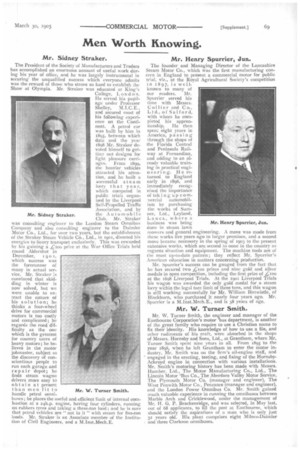Men Worth Knowing.
Page 21

If you've noticed an error in this article please click here to report it so we can fix it.
Mr. Sidney Straker.
The President of the Society of Manufacturers and Traders has accomplished an enormous amount of useful work dur ing his year of office, and he was largely instrumental in securing the unqualified success which everyone admits was the reward of those who strove so hard to establish the Show at Olympia. Mr. Straker was educated at King's College, London. He served his pupilage under Professor
Shelley, M.I.C.E., and secured most of his following experience on the Continent. A petrol car was built by him in 1895, between which date and the year 1898 Mr. Straker devoted himself to gettime out designs for light pleasure cm-riages. From 1899, the heavier vehicles attracted his attention, and he built a successful steam lorry that year, which competed in public trials organised by the Liverpool Self-Propelled Traffic Association, and by
Mr. Sidney Straker. the Autom obile Club. Mr. Straker was consulting engineer to the London Steam Omnibus Company and also consulting engineer to the Daimler Motor Co., Ltd., for over two years, but the establishment of the Straker Stearn Vehicle Co., Ltd., in r9o1, diverted his energies to heavy transport exclusively. This was rewarded by his gaining a ioo prize at the War Office Trials held round Aldershot in December, / g o which success was the forerunner of many in actual service. Mr. Straker is convinced that skidding in winter is now solved, but we were unable to ex. tract the nature of his solution; he thinks a four-wheel drive for commercial motors is too costly and complicated; he regards the road difficulty as the one which is the greatest for country users of heavy motors ; he believes in the motor jobmaster, subject to the discovery of conscientious people to run each garage and repair depot; he finds steam wagon drivers more easy to obtain at present than men fit to handle petrol omnibuses; he places the useful and efficient limit of internal combustion at a 24h.p. engine, having four cylinders, running on rubbers tyres and taking a three-ton load; and he is sure that petrol vehicles are " not in it " with steam for five-ton loads. Mr. Straker is an Associate member of the Institution of Civil Engineers, and a M.Inst.Mech.E.
Mr. W. Turner Smith.
Mr. Henry Spurrier, Jun.
The founder and Managing Director of the Lancashire Steam Motor Co., which was the first manufacturing concern in England to present a commercial motor for public trial, viz., at the Royal Agricultural Society's competition in 1897, is wellknown to many of our readers. Mr. Spurrier served his time with Messrs. Collier and Co., Ltd., of Salford, with whom he completed his apprenticeship. He then spenc eight years in America, passing through the shops of the Florida Central and Peninsula Railway at Fernandina, and adding to an already valuable training in practical engine eri g. He returned to England early in 1896, and immediately recognised the importance of taking up cornnercial automobilism by purchasing the works of Sumner, Ltd., Leyland, Lancs., where a business was being done in steam lawn mowers and general engineering. A move was made from these works five years ago to larger premises, and a second move became necessary in the spring of 1903 to the present extensive works, which are second to none in the country as regards situation and equipment. The machine tools are of the most up-to-date pattern; they reflect Mr. Spurrier's American education in matters concerning production.
Mr. Spurrier's success can be gauged from the fact that he has secured two Lioo prizes and nine gold and silver medals in open competition, including the first prize of ..roo at the 1898 Liverpool Trials. At the 19or Liverpool Trials his wagon was awarded the only gold medal for a steam lorry within the legal tare limit of three tons, and this wagon is still working successfully for Mr. William Birtwistle, of Blackburn, who purchased it nearly four years ago. Mr. Spurrier is a M.Inst.Mech.E., and is 38 years of age. Mr. Henry Spurrier, Jun.
Mr. W. Turner Smith.
Mr. W. Turner Smith, the engineer and manager of the Eastbourne Corporation's motor 'bus department, is another of the great family who require to use a Christian name to fix their identity. His knowledge of how to use a file, and other rudiments of his craft, were absorbed in the shops of Messrs. Hornsby and Sons, Ltd., at Grantham, where Mr. Turner Smith spent nine years in all. From 1895 to the year 1898, when he left Grantham to enter the motor industry, Mr. Smith was on the firm's oil-engine staff, and engaged in the erecting, testing, and fixing of the HornsbyAckroyd engine in connection with various installations. Mr. Smith's motoring history has been made with Messrs. Humber, Ltd., The Motor Manufacturing Co., Ltd., The Lincoln Motor 'Bus Co., The Aberdare Valley Motor Service, The Plymouth Motor Co. (manager and engineer), The West Penwith Motor Co., Penzance (manager and engineer), and the London Power Omnibus Co. MnSmith gained much valuable experience in running the omnibuses between Marble Arch and Cricklewood, under the management of Mr. H. G. P. Brackenridge, and was selected, in May last, out of 68 applicants, to fill the post at Eastbourne, which should satisfy the aspirations of a man who is only just 32 years old. His plant comprises eight Milnes-Daimler and three Clarkson omnibuses.
























